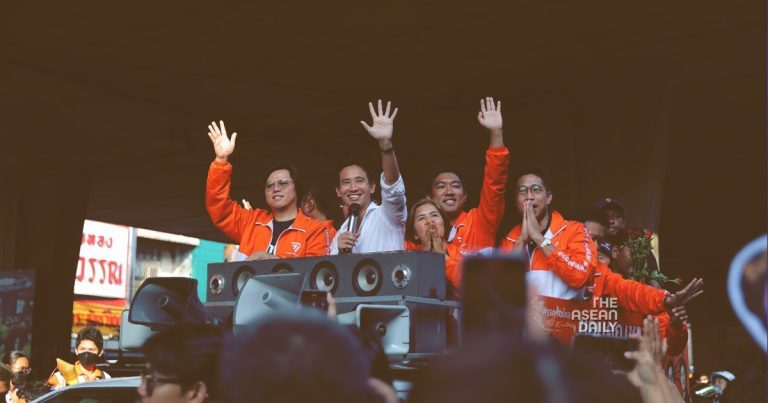22-5-2023 (Bangkok) In a significant move, Thailand’s Move Forward party and its seven political allies came together on Monday (May 22) to sign a memorandum of understanding (MOU) outlining their mutual agreement to pursue 23 agendas once their coalition government is formed.
The MOU, following Move Forward’s surprising victory in the recent general election on May 14, serves as the foundation for the future government formation in Thailand and establishes a common direction of work among the eight member parties.
“This compilation of agendas represents our mutual agreement and our readiness to enact them through governmental and parliamentary mechanisms,” stated Pita Limjaroenrat, leader of Move Forward and the party’s prime ministerial candidate. “It also highlights the shared responsibilities among the parties that will form a government together.”
Key missions outlined in the MOU include drafting a new constitution, legalizing same-sex marriage, reinstating cannabis as a banned narcotic, and transitioning from compulsory enlistment to voluntary recruitment during peacetime.
“All the parties have agreed that the implementation of each mission must not undermine the status of the state under the constitutional monarchy or the inviolable status of the monarch,” added Mr. Pita.
สำเร็จแล้ว!!! 22 พฤษภาคม 2566 เวลา 16.30 น. พรรคก้าวไกล พรรคเพื่อไทย พรรคประชาชาติ พรรคไทยสร้างไทย พรรคเสรีรวมไทย พรรคเพื่อไทรวมพลัง พรรคเป็นธรรม และพรรคพลังสังคมใหม่ ร่วมลงนามบันทึกความเข้าใจร่วมกัน(MOU) ในการจัดตั้งรัฐบาล
อ่านรายละเอียดทั้งหมดได้ที่ https://t.co/V4UyaP3BNe… pic.twitter.com/UBlRQUQIjQ
— พรรคก้าวไกล – V????TE #31 (@MFPThailand) May 22, 2023
The current coalition consists of Move Forward, Pheu Thai, Prachachat, Thai Liberal Party, Thai Sang Thai, Fair, Plung Sungkom Mai, and Pue Thai Rumphlang, collectively holding 313 seats in the 500-member House of Representatives.
The signing of the MOU on Monday holds symbolic significance, reminiscent of the political disruption caused by a coup d’état led by incumbent Prime Minister Prayut Chan-o-cha nine years ago.
On May 22, 2014, the then-army chief seized power from the democratically elected government of Yingluck Shinawatra. The junta, led by General Prayut, governed Thailand for nearly five years until a general election was held in 2019 under a new constitution drafted by a military-appointed committee.
During that election, while the Pheu Thai Party secured the majority of seats in the House of Representatives, the pro-junta Palang Pracharat Party formed the government with its political allies, resulting in General Prayut assuming the position of prime minister.
Having participated in this year’s electoral race in the hopes of retaining power after over eight years in office, General Prayut’s new party, United Thai Nation, faced defeat, finishing fifth.
“Today is a historic day and a significant milestone that reflects the success of Thai society in peacefully transitioning back to a democratic system through the parliamentary process,” emphasized Mr. Pita on Monday.
In addition to the 23 agendas, the eight parties also agreed to govern collectively while safeguarding citizens’ rights, civil liberties, and prioritizing public interests over individual party interests.
“All parties have the right to advocate for additional policies as long as they do not contradict the policies outlined in this memorandum of understanding,” stated Move Forward’s leader.
This collaboration can be facilitated through the executive power held by ministers representing their respective parties or through the legislative power of representatives from any of the eight parties.
Although the MOU does not explicitly mention Move Forward’s policy to amend Thailand’s royal defamation law, Mr. Pita affirmed that his party would continue to push for legal changes within the parliament.
“When the time comes, I believe Move Forward will not be alone,” he added.
Known as the lese-majeste law, Section 112 of the Thai Criminal Code imposes imprisonment of three to 15 years on individuals who defame, insult, or threaten the king, queen, heir-apparent, or regent. Due to its direct association with the monarchy and the severity of the prison sentence, equivalent to that of involuntary manslaughter, the law remains a sensitive and taboo topic in Thai society.




